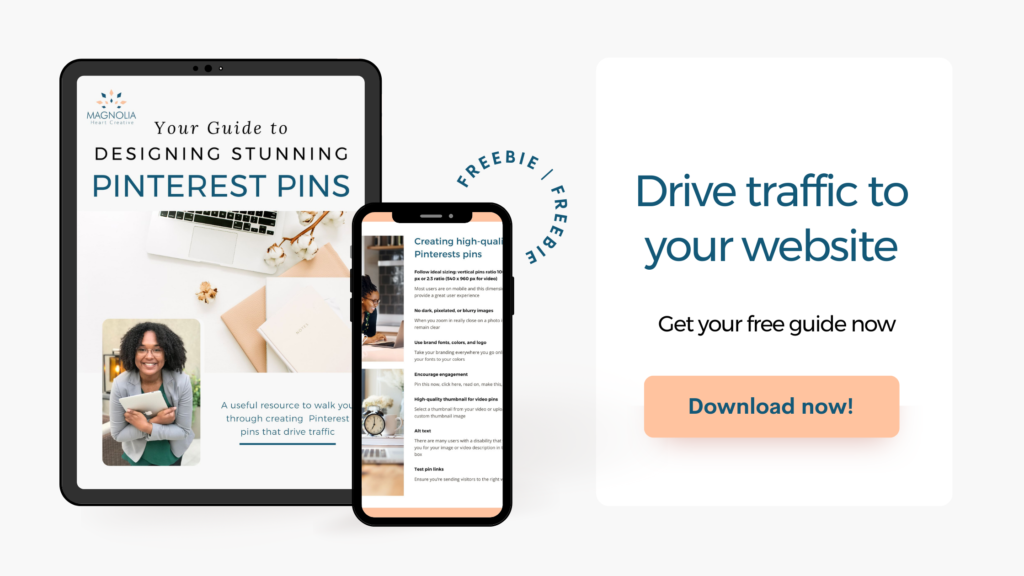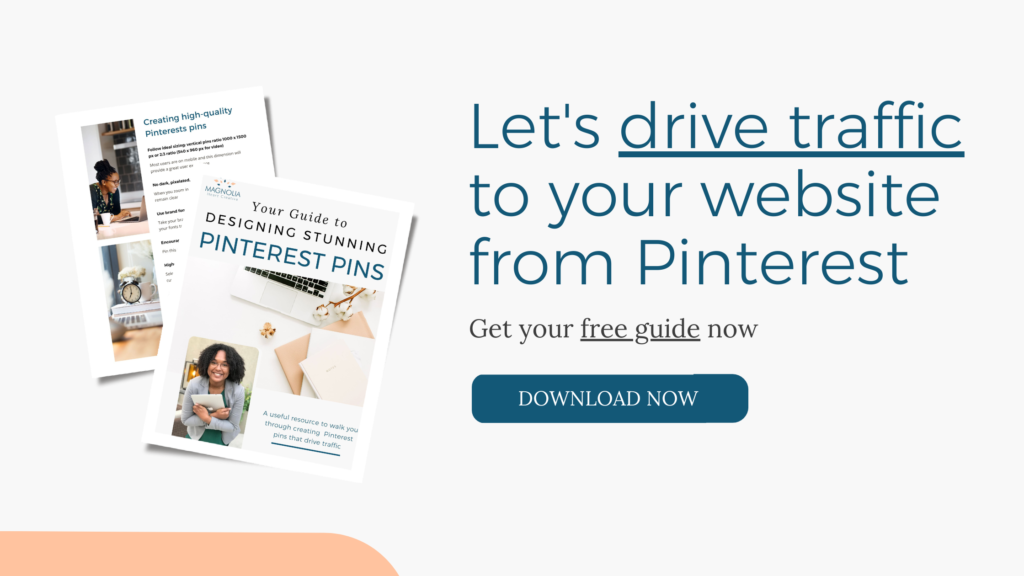
You’re finally on board with the awesome-ness called Pinterest, but you’re feeling a bit shaky on the keywords aspect. You’ve optimized your profile and you’re posting a variety of pins consistently, but there’s something missing. You’re not getting the visibility and click throughs you’re hoping for.
Since Pinterest is a search engine, you gotta invest in determining what your keywords are going to be for your small business.
But here’s the catch – without a strategic approach to keywords, you may be missing out on the full potential of this platform. I’m sure you don’t want that for your business and I definitely don’t want that for you either.
I’m going to guide you through the art of unlocking the power of Pinterest keywords. They don’t have to be scary or intimidating. They really are your BFF on Pinterest. So, get ready to take your Pinterest strategy to new heights.
Let’s dive in!
Why are Pinterest keywords important?
Is it really PB&J if you don’t got the perfect creamy peanut butter? I say, NO! Sorry to all of you crunchy peanut butter lovers out there, but I’m #TeamCreamy. The same goes for Pinterest. You don’t really have the perfect Pinterest strategy if you don’t have a list of delicious keywords.
463 million monthly active users (April 2023) are logging into the platform looking for inspiration, solutions, and things to purchase. That’s a goldmine! But in order to cash in, your content needs to be easily found.
Keywords are the words or phrases that users type into the search bar when looking for specific content. It’s our job as content creators to simply add the same words that users are already typing in the search bar into our pins. Wallah!
Using the right keywords in your Pinterest profile, pins, and boards, will help increase your chances of appearing in user feeds and search results. That my friend is the whole point. You create content and then your ideal audience concumes and reacts to that content.
In order to make this idea your reality, we’ll need to start with conducting thorough keyword research.
1. Start with a Brainstorming Session
Begin your keyword research journey by brainstorming the main topics or themes related to your small business. Make a list of the products and/ or services you offer. This can be done on a note app on your phone or you can create a new Google doc.
Think about your target audience. What are they interested in?
Are they:
- Travelers?
- Gardeners?
- Parents?
- Book lovers?
- Introverts?
- Single?
- Wealthy?
What are their paint points?
- Lack of time?
- Lack of money?
- Fear of _____.
- No access to _____.
Write down as many ideas as you can think of. The beautiful thing is that you already have a lot of keywords inside of your head. This process is going to help you release those words as well as add to that list with some research.
2. Use the Pinterest Search Bar
Keep that list that you made in the last section handy. Now, we’re going to open up the Pinterest app so that we can leverage the search bar. Did you realize that search suggestions can be a goldmine for discovering popular keywords?
When you start typing a query into the search bar, Pinterest provides you with a list of suggestions. These suggestions are keywords! They are the words and phrases popping up based on what other users are searching for. Goldmine!
Try this. Start typing “business owner” and notice how suggested searches and profiles auto populate. You’re going to do the same with your list. Start typing in a word or phrase. Then write down all of those suggestions that you see. Try as many combinations as you want.
You’ll soon notice that certain words come up over and over. Those words are important. They are the words most frequently used by your audience. It’s a great idea to use them as well!
Star them on your list, because you’re beginning to realize what valuable keywords you’ll be incorporating into your content moving forward.

3. Use Pinterest Guided Search
Pinterest Guided Search is another powerful tool within Pinterest for keyword research. After completing a search, right below the search bar there is a horizontal list of suggestions that you can add to your search. This is the Guided Search feature.
It’s amazing because you may not have thought of a particular word or phrase, but Pinterest has your back. It’s going to provide suggestions based on what other users have typed into the search bar. Goldmine!
Use this feature to refine your search queries. Log the suggestions. Also, process what this information is telling you about your ideal audience.
4. Qualify Your Pinterest Keywords
Now you should have a hearty list of keywords. Some of it came from you and the rest from research. Before you call it a day, there’s one last thing to do with your list. You’ll want to evaluate the competitiveness and search volume of your keywords.
The higher the search volume means that more people will likely be looking for pins including those keywords. Noting how competitive a keyword is tells you how many other businesses out there are also creating content using that keyword.
This data can help you prioritize your keyword selection and focus on the ones that have the highest potential to drive traffic to your business.
I recommend these three tools because I use them all the time and love the information available on search volume, competitiveness of keywords, and so much more.

5. Optimize Your Pins and Boards
Congratulations, friend! You now have a list of relevant keywords. Which means that it’s time to optimize your pins and boards to increase their visibility on Pinterest. This step is really important and I have a whole blog post on how to optimize your Pinterest profile.
Optimizing your profile is all about being strategic with your copy so that you can enhance the discoverability of your content and attract more Pinterest users.
With your keyword list handy, be intentional to incorporate your chosen keywords into your pin titles, descriptions, and alt text. Organize your boards around themes your target audience values and then use keyword-rich titles.
Don’t worry, at first it’ll seem like a big ask. But each time that you take these steps, you’ll get better and better at it. Before you know it, you’ll forget that you once found using keywords in your pin title to be intimidating.
Remember, it’s quality over quantity.
6. Analyze Pinterest Analytics
Pinterest analytics provides valuable data about your Pinterest account, including the keywords that are driving the most engagement and traffic. Goldmine!
Take a close look at the keywords that are performing well for your pins and boards. Which words or phrases are repeatedly showing up in your top performing content? The answer to that question is telling you that that keyword should become one of your go-tos.
This is what it means to adjust your strategy based on your analytics. When you discover that a keyword is working really well with your ideal audience, go back to your content calendar and adjust. Add more content related to your top performing pins.
Don’t stop there. Experiment to see which pin designs + keywords are getting you the best results. Fun! Then maybe try testing different variations of pin titles + pin descriptions.
Are you seeing how much control you have over your strategy? How many opportunities there are in Pinterest to use keywords to level up your results?
Let’s Recap
I utterly love Pinterest because it can drive so much traffic to your website. But here’s the catch – without a strategic approach to keywords, you may be missing out on the full potential of this platform. Have no fear, just follow the steps laid out in this post and start getting your pins in front of the right people.
Remember, Pinterest users log into the app to find inspiration, solutions, and to shop. Use your list of keywords alongside creating high-quality pins to be the solution users are searching for.
Learn more about designing high-quality pins by grabbing your free download of Your Guide to Designing Stunning Pinterest Pins.
Which of these five tips are you going to implement first? Comment and let me know!
Keep Reading












